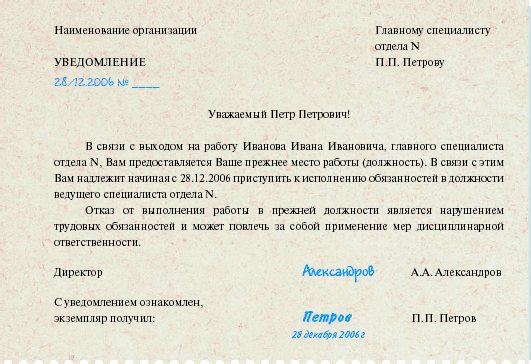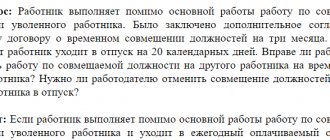Cases and reasons for temporary transfer to another job
Today, there are several main reasons and grounds for allowing the transfer of an employee to another organization to perform professional duties. Thus, the following will be considered legitimate:
- transfer of an employee, which is carried out due to the temporary absence of another employee;
- transfer of an employee to another organization, permitted in the event of force majeure circumstances, which include man-made and natural disasters, industrial accidents and other conditions that cause irreparable harm to the life and health of the workforce and the entire population as a whole;
- transfer of an employee, which is carried out even if it is necessary due to his state of health. In particular, a temporary transfer to another job may be due to the pregnancy of a woman employee of a hazardous enterprise.
Thus, it should be concluded that a temporary transfer of an employee to another organization can be carried out only if there are specific conditions set out in the Labor Code of the Russian Federation.
Terms of temporary transfers
Temporary transfer of an employee to another job is a fairly regulated process. Therefore, fulfillment of all conditions prescribed in labor legislation is the basis for the agreement between the parties to have legal force and be recognized as legitimate. In particular, it is especially important to take into account the period for which the employee’s transfer to another organization is allowed.
The duration of the temporary transfer of an employee depends on the circumstances that formed the basis for such a change in working conditions. The deadline for the employee’s transfer is negotiated by the two parties to the labor relationship, after which an agreement and the corresponding order are signed by the employer.
If we refer to Art. 72.2 of the Labor Code of the Russian Federation, the period for transferring an employee within one organization can be about one calendar year. However, if the employee’s relocation occurred due to the absence of another employee, for example, for health reasons, then the period during which the agreement of the parties is in force will end on the day the absent specialist leaves.
From this statement it follows that the period for transferring an employee to another workplace may exceed a year, for example, if a woman went on maternity leave to care for a child before he or she reached 3 years of age.
In addition, labor legislation provides for the possibility of transferring an employee to another place, even if the person does not sign the agreement. But in this case, the period cannot exceed 1 calendar month.
However, you should pay attention to the fact that, despite the period for transferring the subject to a new workplace, which is equal to 1 month, the employer can each time issue a new order to transfer the employee, thus extending this time period.
Replacing a temporarily absent employee: temporary transfer
As of: 10/09/2006 Magazine: Personnel Directory Year: 2006 Author: Kostyan Irina Aleksandrovna Topic: Documents of the personnel service, Temporary transfer to another job Heading: Personnel practice
In practice, there are often situations in which an employer is forced to replace a temporarily absent employee. This happens in the following cases: an employee uses annual paid leave, leave without pay, during the period of temporary disability, maternity leave, and in other cases when a temporarily absent employee retains his place of work in accordance with the law.
The Labor Code of the Russian Federation provides for several options for replacing a temporarily absent employee: – temporary transfer to another job; – movement; – combination of professions (positions); – concluding a fixed-term employment contract during the employee’s absence.
Different types of replacing a temporarily absent employee have much in common, which is a kind of prerequisite for legal errors made by the parties to an employment contract in practice. At the same time, the above types of replacing a temporarily absent employee differ significantly from each other, both in form and content.
In addition, Federal Law No. 90-FZ dated June 30, 2006 “On amendments to the Labor Code of the Russian Federation, recognition of certain normative legal acts of the USSR as invalid on the territory of the Russian Federation and invalidation of certain legislative acts (provisions of legislative acts) of the Russian Federation” introduced a number of significant changes to the legal regulation of replacing a temporarily absent employee.
In order to determine which of the existing forms to choose, taking into account specific circumstances, it is necessary to identify the features of each of them, which will allow us to find the optimal, and in some cases, the only acceptable path.
Today we will talk about temporary transfer to another job to replace a temporarily absent employee.
As a rule, to replace a temporarily absent employee, a temporary transfer to another job due to production needs was used in practice. Before amendments were made to the Labor Code of the Russian Federation (in 2006) in accordance with Art. 74 of the Labor Code of the Russian Federation, in case of production necessity, the employer had the right, on his own initiative, to transfer an employee in the same organization to another job not stipulated by the employment contract. Production necessity was understood, in particular, as the need to replace an absent employee.
The changes made to the Labor Code of the Russian Federation in 2006 somehow modified the legal potential of both the employer and the employee in the situation under consideration. Now the norms of the Labor Code of the Russian Federation provide for the possibility of using a temporary transfer both in case of production necessity and in situations not related to it.
Note!
Temporary transfers can be carried out: by agreement of the parties (employee and employer); unilaterally at the initiative of the employer: in the absence of the employee’s consent; with the employee's consent
In modern conditions, temporary transfers can be conditionally divided into two groups: transfers allowed by agreement of the parties (employee and employer); transfers carried out by the employer unilaterally on his own initiative.
In turn, temporary transfers at the initiative of the employer are of two types: transfers carried out by the employer in the absence of the employee’s consent, and transfers permitted with the employee’s consent.
Let's consider three possible options for temporarily transferring an employee to replace an absent employee.
Translation by agreement of the parties
In accordance with Part 1 of Art. 722 of the Labor Code of the Russian Federation, a temporary transfer to another job with the same employer to replace a temporarily absent employee is allowed only by agreement of the parties.
The previously valid norm provided for in Art.
74 of the Labor Code of the Russian Federation, did not regulate the procedure for temporary transfer to another job by agreement of the parties, but did not prohibit it. In practice, in order to replace a temporarily absent employee, the parties to an employment contract often used their right to make appropriate changes to the employment contract, including those of a temporary nature, by agreement of the parties. Therefore, in the situation under consideration, on the basis of a written agreement signed by the parties, the labor function of the employee, the structural unit in which he worked, the amount and forms of remuneration, etc. could be changed for a certain period of time. Previously, parts 2, 3 of Art. 74 Labor Code of the Russian Federation Now, art. 722 Labor Code of the Russian Federation
| The duration of a transfer to another job to replace an absent employee cannot exceed one month during a calendar year (from January 1 to December 31). With written consent, an employee may be transferred to a job requiring lower qualifications. | By agreement of the parties, concluded in writing, an employee may be temporarily transferred to another job with the same employer for a period of up to one year, and in the case where such a transfer is carried out to replace a temporarily absent employee, whose job is retained in accordance with the law, - before the employee returns to work. If, at the end of the transfer period, the employee’s previous job is not provided, and he did not demand its provision and continues to work, then the condition of the agreement on the temporary nature of the transfer loses force and the transfer is considered permanent. In the event of a natural or man-made disaster, industrial accident, industrial accident, fire, flood, famine, earthquake, epidemic or epizootic, and in any exceptional cases threatening the life or normal living conditions of the entire population or part of it, the employee may be transferred without his consent for a period of up to one month to work not stipulated by the employment contract with the same employer to prevent these cases or eliminate their consequences. Transfer of an employee without his consent for a period of up to one month to a job not stipulated by the employment contract with the same employer is also allowed in cases of downtime (temporary suspension of work for reasons of economic, technological, technical or organizational nature), the need to prevent destruction or damage to property or When transfers are made in cases provided for in parts two and three of this article, the employee is paid according to the work performed, but not lower than the average earnings for the previous job. |
However, the absence of legal norms establishing the right and procedure for transferring to another job to replace a temporarily absent employee, for example, for the period of his being on parental leave for up to three years, entailed the transformation of an employment contract concluded for an indefinite period into a fixed-term employment contract . Therefore, the basis for termination of an employment contract with an employee transferred to another job of a temporary nature was often the end of its validity period, due to the return to work of a temporarily absent employee, whose place of work was retained by law. All this significantly reduced the legal guarantees of workers temporarily transferred by agreement of the parties to another job for the long-term replacement of a temporarily absent employee.
Currently, based on a written agreement of the parties, two types of temporary transfers are allowed: – for a period of up to one year; – for the entire period of absence of the employee, whose place of work is retained by law.
transfer to another job for a period of up to one year is essentially unlimited. Therefore, from a formal point of view, it seems possible, by agreement of the parties, to temporarily transfer an employee either to replace a temporarily absent employee or to a vacant position. In this regard, the employer has time to solve his problems, for example, to find a suitable employee, in his opinion, for a vacant position.
Note!
Now the Labor Code of the Russian Federation allows the temporary transfer of an employee to a vacant position for a period of up to 1 year. Mandatory condition - agreement of the parties
Transfer to work to replace a temporarily absent employee is limited to the period of absence of the employee, during which, by law, the place of work is retained. In this case, the end date of the temporary transfer is the date of return to work of the temporarily absent employee, whose job is retained in accordance with the law.
In the second case, a temporary transfer to another job is allowed only to replace a temporarily absent employee.
Obviously, this form of replacement can be used by the employer and employee in situations where it is necessary to replace an employee who is on maternity leave, child care leave, due to temporary disability, etc. ( Appendix
1)
Thus, on the one hand, the legislator increased the duration of the temporary transfer of an employee to another job to replace an absent employee to one year or more, on the other hand, such a transfer is not allowed unless there is an agreement between the parties.
What is meant by “agreement of the parties”? Will the employee’s signature on the transfer order be sufficient?
The employee’s consent to transfer to another job to replace a temporarily absent employee in this situation is clearly not enough. Therefore, familiarizing an employee with the employer’s order to transfer him to another job for a certain period and obtaining his consent to such a transfer cannot be considered fully as compliance with labor laws.
It also seems unlawful to carry out a temporary transfer to another job to replace a temporarily absent employee by notifying the employee about this against a signature and obtaining written consent from him for such a transfer. The issuance of an employer’s order on a temporary transfer to another job and an employee’s visa agreeing to work under changed conditions or a written statement from the employee in which he expresses his consent to the transfer also does not allow this to be fully regarded as the employer’s compliance with labor laws. This is due to the different content of the concepts of “consent” and “agreement”.
The consent of one party (the employee) presupposes the presence of an initiative coming from the other party to the employment contract - the employer. Meanwhile, the agreement of the parties represents the possibility of a bilateral (on an equal basis) determination by the parties of working conditions. In this case, a temporary transfer to another job can be carried out as a result of the parties agreeing on all the terms of the employment contract that are subject to change: the amount of remuneration, working hours, etc. Therefore, the agreement of the parties on the temporary transfer of an employee to another job with the same employer is subject to conclusion in writing.
Note!
The basis for issuing an order to transfer an employee to another job, including replacing a temporarily absent employee, is an additional agreement to the employment contract
Consequently, the basis for an order to temporarily transfer an employee to another job in this case is a written agreement of the parties to amend the employment contract. Such an agreement is drawn up, as a rule, in two copies - one for each party. (The exception is when an employment contract is concluded in more than two copies.) It must be signed by both parties to the employment contract. The content of the agreement may include conditions that change in connection with ongoing activities: change of position (specialty, job function); structural unit, as well as conditions related to this transfer, such as changes in wages, changes in working hours, the period of changes made to the employment contract by agreement of the parties.
Note!
Part 1 art. 722 of the Labor Code of the Russian Federation provides for cases when a temporary transfer will be considered permanent
It is necessary to pay attention to the legal consequences provided for in Part 1 of Art. 722 Labor Code of the Russian Federation. The expiration of the transfer period may entail recognition of the condition on the temporary nature of such a transfer as no longer in force, and the temporary transfer will thus be considered permanent. This happens when two circumstances exist simultaneously:
– the employer did not provide the employee with the previous job; – the employee has not made a demand to be provided with his previous job.
Here we can see the application of the analogy of the law regulating the rule for transforming fixed-term employment relationships into relationships of a permanent nature, according to which the absence of the will of the parties (one of the parties) to an employment contract entails the recognition of a fixed-term employment contract as a contract concluded for an indefinite period. This significant change obliges the employer to monitor the validity period of the temporary transfer. It must be taken into account that the employer does not always know the date of return to work of the employee, who, by law, retains his place of work.
For example, a woman on maternity leave has the right to interrupt it at her own discretion at any time convenient for her and go to work without notifying the employer.
The date of her return to work should serve as the basis for the parties to the employment contract (employee and employer) for the expiration of the transfer to another job.
At the same time, the rules of Part 1 of Art. 722 of the Labor Code of the Russian Federation are not formulated correctly enough. Thus, the transformation of a temporary transfer into a permanent transfer is due to the lack of action on the part of the employer to provide the previous job to the employee transferred to another job to replace the temporarily absent employee.
At the same time, the procedure for providing an employee with his previous job is not defined by law. In this regard, questions arise: – Is it necessary to issue an order to transfer the employee to his previous place of work and what in this case can serve as the basis for such a transfer? – Is it necessary to notify the employee in writing about the entry of a temporarily absent employee into his workplace, and if so, in what form? – Is it possible not to formalize in writing the fact that an employee temporarily transferred to another job is given his previous place of work (position)?
In our opinion, the rule provided for by labor legislation for transforming a temporary transfer into a permanent transfer obliges the employer to notify the employee (notify him) of the provision of the previous job in connection with the return to work of the employee whom he replaced in accordance with a written agreement of a temporary nature. Otherwise, a situation is possible in which two employees may find themselves in the same position, who will be persons working under an employment contract concluded for an indefinite period. Thus, if on the day a temporarily absent employee returns to work, the employer does not provide the previous job to the employee temporarily replacing the absent employee, then two persons may find themselves in the same position at once.
Let’s assume that on December 28, 2006, Ivan Ivanovich Ivanov, due to the end of his temporary disability, goes to work as the chief specialist of department N in accordance with the terms of the employment contract concluded when he was hired. At the same time, on December 28, 2006, in accordance with the Internal Labor Regulations, Petrov Petrov, transferred to the same position from the position of leading specialist of the same department in accordance with a written agreement of the parties, went to work during the absence of Ivan Ivanovich Ivanov.
In the situation under consideration, if the employer on December 28, 2006 does not provide Pyotr Petrovich Petrov with the previous job he occupied before his transfer to the position of chief specialist of department N, and P.P. Petrov himself does not demand its provision, then P.P. Petrov will find himself working in the position of chief specialist of department N. The condition on the temporary nature of the transfer of Petrov P.P. on December 28, 2006 becomes invalid.
To avoid such situations, the employer will most likely have to somehow record the fact that Petrov P.P. was given his previous job (position) (occupied by him before the transfer).
The most optimal, in our opinion, may be to notify P.P. Petrov about I.I. Ivanov’s return to work and, in connection with this, provide P.P. Petrov with his previous job ( Appendix
2).
Such notice should be provided in writing. Its content can be arbitrary. It seems that the notice must be signed by a person who has the right to hire and fire employees. It can be prepared in two copies, one of which must be given to the employee, and the other, which remains with the employer, must have a receipt stamp.
If an employee for any reason refuses to receive a notice, it is advisable for the employer to draw up a report about this.
Note!
The procedure for registering the provision of an employee’s previous place of work by the Labor Code of the Russian Federation is not defined
In our opinion, there is no need to issue an order to transfer the employee to his previous place of work, since the transfer itself is temporary. At the same time, such an order cannot be considered illegal due to the fact that the procedure for formalizing the provision of a former job to an employee is not defined by law. Therefore, the employer, taking into account the office management rules in force in the organization, has the right to issue an order (instruction) to transfer the employee to his previous place of work in connection with the return to work of an employee who retained his previous place of work during the period of his absence.
Such a document must contain the following information: – last name, first name and patronymic of the employee; – the name of the position in which he is in connection with the temporary transfer; – the name of the position to which he should return; – basis (the fact that the employee went to work, indicating his last name, first name and patronymic, the reasons for his absence); – date of transfer.
If such an order (instruction) of the employer on transfer to the previous place of work is issued, the employee must be familiarized with it against receipt. In case of refusal to familiarize yourself with the order (instruction) or refusal to sign to familiarize yourself with it, this fact should be documented in the appropriate act.
Transfer at the initiative of the employer in the absence of the employee’s consent
In the absence of the employee’s consent, as before, a temporary transfer to another job is allowed at the initiative of the employer if it is necessary to replace a temporarily absent employee for a period not exceeding one month.
In this case, the transfer of the employee is permitted to a job not stipulated by the employment contract with the same employer, and the employee’s consent to such a transfer is not required. The exception is cases of transfer to a job requiring lower qualifications, which are permitted only with the written consent of the employee. Just as before, the employee is paid according to the work performed, but not lower than the average earnings for the previous job.
Note!
The number of temporary transfers at the initiative of the employer for a period of up to one month to replace a temporarily absent employee in case of production necessity is not limited
It should be noted that since Part 3 of Art. 722 of the Labor Code of the Russian Federation does not contain any restrictions on the number of temporary transfers allowed at the initiative of the employer for a period of up to one month, it seems that such transfers may be of a repeated nature. The rule, which was previously provided for in Parts 1 and 2 of Art. 74 of the Labor Code of the Russian Federation, limited the maximum permissible duration of a temporary transfer to replace an absent employee to one month within one calendar year (from January 1 to December 31). This made it possible to talk about the possibility of repeatedly transferring an employee to another job to replace an absent employee, but for a total period of no more than one month during the calendar year. Today such a statement is not supported by anything.
At first glance, the innovation essentially weakened the legal guarantees of workers. The norm in question contradicts the principle of labor law enshrined in Art. 2 of the Labor Code of the Russian Federation, which proclaims freedom of labor, including the right to work, which everyone freely chooses or to which one freely agrees, the right to dispose of one’s ability to work, to choose a profession and type of activity. So, within the meaning of Part 3 of Art. 722 of the Labor Code of the Russian Federation, in the absence of any restrictions, the employer has the right to repeatedly use the employee’s labor at his own discretion, repeatedly require him to perform work not stipulated by the employment contract, for periods of up to one month. In this case, the declarative provision provided for in Art. 2 of the Labor Code of the Russian Federation, a principle declaring the obligation of the parties to an employment contract to comply with the terms of the concluded contract, including the right of employees to demand from the employer compliance with his duties towards them. In addition, it seems doubtful whether it is possible to protect the employee’s right to demand that the employer provide him with work stipulated by the employment contract.
However, in reality there is no contradiction here. When applying Part 3 of Art. 722 of the Labor Code of the Russian Federation, which allows the temporary transfer of an employee at the initiative of the employer to a job not stipulated by an employment contract in the same organization in case of production necessity, it is necessary to be guided by international legal acts.
Note!
The transfer of an employee without his consent for a period of up to one month, including to replace a temporarily absent employee, is allowed only in the presence of emergency circumstances specified in Part 2 of Art. 722 Labor Code of the Russian Federation
So, in accordance with paragraph 1 of Art. 1 of the ILO Convention No. 29 of 1930 on forced or compulsory labor (ratified by the Decree of the Presidium of the Supreme Soviet of the USSR dated 06/04/56) the Russian Federation undertook to abolish the use of forced or compulsory labor in all its forms, i.e. any work or service required from any person under threat of any punishment and for which this person did not voluntarily offer his services (clause 1 of Article 2 of the Convention). At the same time, by virtue of sub. "d" clause 2 art. 2 of the said Convention and Part 4 of Art. 4 of the Labor Code of the Russian Federation, any work or service required under emergency circumstances is not considered forced labor.
i.e. in cases of declaration of a state of emergency or martial law, disaster or threat of disaster, such as: fires, floods, famine, earthquakes, severe epidemics or epizootics, invasions of harmful animals, insects or plant parasites, as well as in other cases threatening threat or may endanger the life or normal living conditions of all or part of the population.
Thus, the employer has the right to transfer the employee to work not stipulated by the employment contract in order to prevent a catastrophe, industrial accident or eliminate the consequences of a catastrophe, accident or natural disaster;
to prevent accidents (Part 2 of Article 722 of the Labor Code of the Russian Federation).
At the same time, based on the specified provisions of the ILO Convention on Forced or Compulsory Labor, provided for in Part 2 of Art. 722 of the Labor Code of the Russian Federation, temporary transfer of an employee without his consent to work not stipulated by an employment contract to prevent downtime (temporary suspension of work for reasons of an economic, technological, technical or organizational nature), destruction or damage to property, as well as to replace an absent employee
may be recognized as justified provided that this was caused by emergency circumstances (subparagraph “e” of paragraph 4 of the Convention, part 4 of article 4 of the Labor Code of the Russian Federation), or when failure to take these measures could lead to a catastrophe, industrial accident, or natural disaster, accident and similar consequences.
Considering the large role of international legal acts in regulating labor relations, we should be more attentive to the conventions ratified by our state and in force on its territory.
In the case of a legal and justified temporary transfer of an employee to another job at the initiative of the employer, the employee does not have the right to refuse to comply with the employer’s order, by which he is temporarily transferred to another job for a period of up to one month. Moreover, by virtue of clause 19 of the resolution of the Plenum of the Supreme Court of the Russian Federation dated March 17, 2004 No. 2 “On the application by the courts of the Russian Federation of the Labor Code of the Russian Federation,” refusal to perform work during a translation carried out in compliance with the law is recognized as a violation of labor discipline, and absenteeism work - absenteeism.
However, it should be taken into account that by virtue of para. 5 tbsp. 219 and part 7 of Art. 220 of the Labor Code of the Russian Federation, an employee cannot be subject to disciplinary action for refusing to perform work in the event of a danger to his life and health due to violation of labor protection requirements, except for cases provided for by federal laws, until such danger is eliminated or from performing heavy work and work with harmful and (or) dangerous working conditions not provided for in the employment contract.
Since the Labor Code of the Russian Federation does not contain rules prohibiting an employee from exercising this right, his refusal to temporarily transfer to another job in accordance with Art. 722 of the Labor Code of the Russian Federation for the above reasons is justified.
transfer to a job with lower qualifications with the consent of the employee
Transfer of an employee at the initiative of the employer to a job requiring lower qualifications for a period of up to 1 month in case of emergency situations is permitted only with the written consent of the employee.
The absence of the employee's written consent to such a transfer does not allow the employer to require him to perform work not stipulated by the employment contract. In this regard, a transfer to another (temporary) job at the initiative of the employer, committed in violation of labor legislation, in particular in the absence of the written consent of the employee, is illegal. Therefore, the employee’s refusal to comply with the employer’s order in this case is lawful, and the employer therefore does not have the right to apply disciplinary measures to the employee.
The employee's written consent presupposes the employer's initiative, so it can be formalized in various ways. In particular, the employer has the right to issue an order (instruction) to transfer an employee to replace a temporarily absent employee for a job requiring lower qualifications. The basis for such an order (instruction) may be the consent of the employee, executed in writing ( Appendix
3)
By the way
| As a general rule, the appointment of an employee to temporarily perform duties in a vacant position is not permitted. Thus, clarifications of the USSR State Labor Committee No. 30 and the All-Russian Central Council of Trade Unions No. 39 dated December 29, 1965 “On the procedure for paying temporary substitution” determine the procedure for assigning the duties of a temporarily absent employee. In particular, in accordance with paragraph 2 of the clarifications, the appointment of an employee as acting for a vacant position is not allowed. The exception is cases of performance of duties in a position, appointment | which is carried out by a higher management body. In this case, the head of the organization is obliged, no later than one month from the date of hiring the employee, to submit documents to the higher management body for his appointment to the position. The management body must consider this issue within one month from the date of receipt of the documents and inform the manager about the results. If an employee hired by a manager who is not from among the employees of this organization is not confirmed in the position, he must | be offered another job taking into account his qualifications and work experience. In the absence of appropriate work or refusal of the offer, he is released from work on the grounds provided for by law, for example, by agreement of the parties. In the event that an employee promoted to a managerial position from the reserve of a given organization is not approved, he must be provided with work with qualifications and pay not lower than what he performed before being appointed to the new position. |
Thus, the basis for transferring an employee to replace a temporarily absent employee, depending on the period, are: - written agreement of the parties - transfer for a period of up to one year, as well as for the period of absence of the employee, who, by law, retains his previous place of work; – written order (instruction) of the employer – transfer for a period of up to one month (if there are sufficient grounds); – written order and written consent of the employee – transfer for a period of up to one month (if there are sufficient grounds for this) subject to performing work of a lower qualification.
Annex 1
Example of an additional agreement to an employment contract
Appendix 2
An example of notifying an employee about providing him with his previous job in connection with the return to work of a temporarily absent employee

Appendix 3
An example of registering an employee’s consent to transfer to replace a temporarily absent employee for a period of up to 1 month to a job requiring lower qualifications

Temporary transfer without employee consent
If we turn to the letter of the law, it is possible to transfer an employee to another place of work without obtaining his consent. This possibility is due to a number of reasons, which, in general, copy the grounds for transferring an employee by agreement of the parties:
- disasters that can be either man-made or natural;
- accident at work or accidents during the performance of professional duties stipulated by the employment contract;
- flood, fire or, for example, an epidemic;
- other conditions that threaten the lives of the population, including the workforce.
However, when transferring an employee to another place without consent, it is also possible, according to labor legislation, and in cases where:
- there is downtime caused by man-made, economic or production problems;
- there is a need to preserve the organization’s property and prevent its damage or complete destruction;
- It is necessary to temporarily replace an employee of the company.
It should be noted that all these grounds must be determined by an emergency situation, and not by the personal desire of the employer. Only in this case will such a translation be fully justified and legitimate.
Temporary transfer regulations
As noted above, transferring an employee to another workplace implies compliance with certain regulations, like any other legally significant action:
- at the first stage, the employer must notify the employee of the need to transfer the enterprise employee to another workplace. To do this, the employer forms either a written request or outlines the need orally.
- Next, an agreement between the parties is formed, modifying the terms of the employment contract, which must be signed by the two parties to the legal relationship. The agreement contains comprehensive information about working conditions: the amount of wages, the length of the working day, the transfer period, etc.
- Once the agreement is signed, the employer can issue an order to transfer the employee for a specific period. The order must be presented in a unified form established by the labor legislation of the Russian Federation. In particular, the order is issued in standard form N T-5 or N T-5a.
- The order must be sent to the employee for review, after which he certifies that he has read the document with his signature.
However, it should be noted that the regulations for the temporary transfer of an employee, when his consent is not required, have different conditions. In particular, the employer initially issues an official order to transfer the employee, within the framework of which such a need is justified. The order has the same unified form N T-5 or N T-5a.
But in such situations, the order must be supported by additional documents that determine this need. If such documents are missing, the order will not have legal force, and the employee will be able to refuse the transfer legally. If the legal regulations are followed, an additional agreement is signed and attached to the current employment contract.
Replacing a temporarily absent employee
In any organization, a situation may arise when an employee is absent for a long time - sick, on vacation or a long business trip, studying outside of work, etc. However, the work must be done. Today we’ll talk about options for assigning the duties of a temporarily absent employee to another employee: we’ll tell you how to formalize such performance of duties, whether it is necessary to make an entry in the work book, and answer questions that arise along the way. The Labor Code offers more than one option for fulfilling the duties of a temporarily absent employee: - without release from work specified in the employment contract; — temporary transfer; — movement; - part-time job; - fixed-term employment contract. Let's take a closer look at each of these options.
We use the internal resources of the organization
Combination or expansion of service areas. Based on Art. 60.2 of the Labor Code of the Russian Federation, an employee may be assigned to perform, during the established duration of the working day (shift), along with the work specified in the employment contract, additional work in a different or the same profession (position) for additional pay. If additional work is carried out in another profession (position), this will be a combination, and if in the same profession (position) - an expansion of service areas, an increase in the volume of work.
At the same time, Art. 60.2 of the Labor Code of the Russian Federation makes a reservation that in order to fulfill the duties of a temporarily absent employee without release from the work specified in the employment contract, the employee may be assigned additional work either in a different or in the same profession (position).
The period during which the employee will perform additional work, its content and volume are determined by the employer with the written consent of the employee and formalized in an agreement. The same agreement also approves the amount of additional payment for additional work (Article 151 of the Labor Code of the Russian Federation) - either in a fixed amount or as a percentage of the salary (both for the main position and for the position being replaced).
I would like to focus your attention on paying for additional work. The Ministry of Health and Social Development in Letter dated March 12, 2012 N 22-2-897 explained that sometimes the performance of duties of an absent specialist may not be paid. This is possible when the job descriptions of certain categories of employees provide for cases of performing the duties of an absent specialist with a similar job function. In this case, the combination is part of the labor function and is not subject to payment.
Note. If the assigned work in another profession requires additional skills or education, assess whether the employee can perform it without compromising his work, otherwise it is better to use another replacement option.
However, the author does not agree with this position, and here's why. Involvement of an absent employee in the temporary performance of duties at a position must in any case be carried out by the employer issuing an appropriate order (instruction), as required by Explanation of the State Committee for Labor of the USSR No. 30, All-Russian Central Council of Trade Unions No. 39 of December 29, 1965 “On the procedure for paying temporary substitution,” regardless of whether whether the possibility of such involvement is indicated in the employment contract or job description of the employee. In addition, Art. 151 of the Labor Code of the Russian Federation, the establishment of additional payment for performing additional work is also not made dependent on the presence or absence in the employment contract (job description) of an indication of the performance of the duties of the absent employee. Therefore, we believe that the employee for performing additional work is in any case entitled to an additional payment in the amount determined by the parties to the labor relationship.
Based on the agreement, an order is issued. It might look like this, for example:
Limited Liability Company "Vesna"
May 14, 2013 Krasnoyarsk
Order No. 41 On assigning additional work in order to combine positions
Due to the absence of a payroll accountant, Anokhina V.L. due to advanced training with separation from production on the basis of Art. 60.2 and 151 of the Labor Code of the Russian Federation
I order: 1. Instruct the senior accountant Volkova A.S. performing, during the established working hours, along with the work specified in the employment contract, additional work as a payroll accountant for additional payment. 2. Install Volkova A.S. monthly additional payment for performing additional work in order to combine positions in the amount of 12,000 rubles. 3. Determine the period of combination of Volkova A.S. as a payroll accountant from 05/15/2013 to 07/19/2013.
Reason: additional agreement dated May 14, 2013 to the employment contract dated August 5, 2009 N 9-08.
Director Medvedev /Medvedev A.D./
The order has been reviewed by: payroll accountant Anokhin, 05/14/2013 /Anokhina V.L./ senior accountant Volkova, 05/14/2013 /Volkova A.S./
Remember that the employee has the right to refuse to perform additional work ahead of schedule by notifying the employer in writing no later than three working days in advance (Article 60.2 of the Labor Code of the Russian Federation). The employer can also cancel the order to complete it ahead of schedule by notifying the employee of this within the same time frame.
Temporary transfer. A transfer is considered a permanent or temporary change in the labor function of the employee and (or) the structural unit in which the employee works (if the structural unit was specified in the employment contract), while continuing to work for the same employer (Article 72.1 of the Labor Code of the Russian Federation).
More specifically, the procedure for temporary transfers is defined in Art. 72.2 Labor Code of the Russian Federation. In particular, according to this rule, an employee can be temporarily transferred to another job with the same employer for a period of up to one year. If a temporary transfer is carried out to replace a temporarily absent employee, whose job remains in accordance with the law, the period of such transfer may be more than a year (for example, for the period of parental leave for a child under 1.5 years of age).
In any case, a temporary transfer for the period of replacement of an absent employee is permitted only by agreement of the parties, concluded in writing.
The conditions of the temporary transfer and its duration are stipulated by the parties in an additional agreement to the employment contract. Based on such an agreement, a transfer order is issued. Let us remind you that the unified forms of orders established by Resolution of the State Statistics Committee of the Russian Federation dated January 5, 2004 N 1, are not mandatory for use since 2013, therefore a transfer order can be issued in a form approved by the organization. In this case, it is important to indicate in the order the nature of the transfer - temporary and, as a basis, provide the details of the transfer agreement - its date and number. The employee must be familiarized with such an order against signature.
Note. If, at the end of the transfer period, the employee’s previous job is not provided, and he did not demand its provision and continues to work, then the condition of the agreement on the temporary nature of the transfer loses force and the transfer is considered permanent.
Question: Is the employee’s signature on the temporary transfer order sufficient for the transfer agreement to be considered reached?
No, not enough. A separate document is required - an agreement in which the parties on an equal basis will determine the conditions of the temporary transfer. It is this agreement, signed by both parties to the labor relationship, that is the basis for issuing a transfer order.
Remember that if an employee’s responsibilities change during a transfer, he must be familiarized with the new job description. The same applies to safety regulations (Part 2 of Article 225 of the Labor Code of the Russian Federation). Regarding making an entry in the work book, we will say the following. Neither the Rules for maintaining and storing work books*(1) nor the Instructions for filling out work books*(2) provide for making entries in the work book about temporary transfers. In addition, Art. 66 of the Labor Code of the Russian Federation establishes that information about the employee, the work he performs, transfers to another permanent job and the dismissal of the employee is entered into the work book. Accordingly, there is no need to record a temporary transfer.
The question often arises whether it is necessary to formalize the return of an employee to a permanent place. The Labor Code does not answer this question. However, in order to avoid controversial situations, we recommend sending the employee a notification about the return to work of the main employee, which is drawn up in any form. You can also issue an order to terminate temporary duties and return to your old position. It is compiled in any form.
Moving. To replace a temporarily absent employee, you can use relocation. It, unlike a transfer, does not require the employee’s consent, provided that it is carried out to another workplace, to another structural unit located in the same area, and this does not entail a change in the terms of the employment contract determined by the parties (Part 3 of Art. 72.1 of the Labor Code of the Russian Federation). Without consent, an employee can be moved to work on another mechanism or unit, but subject to the above conditions.
In order to find out whether an employee can be moved, you need to check the employment contract with him. Quite often, employers indicate as the place of work the name of the structural unit in which the employee will work, but meanwhile, in accordance with Art. 57 of the Labor Code of the Russian Federation, it is necessary to name a structural unit only if the employee is accepted into a branch, representative office or other separate unit located in another area.
For your information. By virtue of clause 16 of the Resolution of the Plenum of the Armed Forces of the Russian Federation of March 17, 2004 N 2 “On the application of the Labor Code of the Russian Federation by the courts of the Russian Federation”, another locality is understood as an area outside the administrative-territorial boundaries of the corresponding locality.
Thus, if a structural unit is specified in an employee’s employment contract, then it will not be possible to move him to another structural unit to replace a temporarily absent employee even without changing the position or job function - this will be a change in the terms of the employment contract determined by the parties and will require the consent of the employee.
We attract external labor
If the responsibilities of the absent employee are extensive, and other company employees are heavily loaded with work, so as not to disrupt the production process, the employer may decide to hire outside workers to replace the temporarily absent employee.
Part-time job. This option for fulfilling the duties of an absent employee is suitable not only for an external employee, but also for employees already working in the company.
So, Art. 60.1 of the Labor Code of the Russian Federation allows you to replace an absent employee for a certain time by registering a part-time job. Article 282 of the Labor Code of the Russian Federation defines part-time work as the performance by an employee of other regular paid work under the terms of an employment contract in his free time from his main job. Moreover, such an employment contract can be concluded both with the same employer (internal part-time job) and with another employer (external part-time job).
An important nuance of part-time work is not only the presence of a separate employment contract, but also the length of working hours. So, by virtue of Art. 284 of the Labor Code of the Russian Federation, the duration of working time for such work should not exceed four hours a day. On days when the employee is free from performing work duties at his main place of work, he can work part-time full time (shift).
Based on Art. 285 of the Labor Code of the Russian Federation, remuneration for persons working part-time is made in proportion to the time worked, depending on output or on other conditions determined by the employment contract. When setting standard assignments for persons working part-time with time-based wages, wages are paid based on the final results for the amount of work actually completed.
To register a part-time job, the employee submits the documents specified in Art. 65 of the Labor Code of the Russian Federation, and a certificate about the nature and conditions of work at the main place of work (Article 283 of the Labor Code of the Russian Federation) - when hiring for hard work, work with harmful and (or) dangerous working conditions. One caveat: the part-time worker does not present a work book, since all entries in it are made by the employer at the main place of work. Therefore, if an employee wants to see an entry in the work book about part-time work, then he needs to submit a document confirming part-time work at the main place of work (Article 66 of the Labor Code of the Russian Federation).
Then an employment contract is concluded, which must indicate that the job is a part-time job. And, of course, other actions are taken to formalize the hiring process: an employment order is issued, a personal card is created (even for an internal part-time worker).
Fixed-term employment contract. If other options for replacing an absent employee are not suitable, you can use another one - concluding a fixed-term employment contract with a new employee. However, in this case it is necessary to take into account the requirements of Art. 58 of the Labor Code of the Russian Federation, on the basis of which a fixed-term employment contract is concluded when employment relations cannot be established for an indefinite period, taking into account the nature of the work to be done or the conditions for its implementation, namely in the cases provided for in Part 1 of Art. 59 Labor Code of the Russian Federation. For our situation, the basis specified in paragraph. 2 part 1 of this article: for the duration of the performance of the duties of an absent employee, whose place of work is retained in accordance with labor legislation and other regulatory legal acts containing labor law norms, a collective agreement, agreements, local regulations, and an employment contract.
Note! Based on Art. 57 of the Labor Code of the Russian Federation, when concluding a fixed-term employment contract, it is necessary to indicate the start date of work, as well as the period of its validity and the circumstances (reasons) that served as the basis for its conclusion. If this is not done, the contract will be considered concluded for an indefinite period.
When formulating a condition on the duration of an employment contract, it is advisable to indicate not only the duration of the contract, but also its expiration date, since in the future this will help to avoid disputes when terminating the contract due to the end of its term. For example, the wording may be as follows: “This agreement was concluded for the period of training of accountant R.Z. Sorokina. from 03/04/2013 to 06/04/2013.”
But what to do when the end date of work, and even the duration of the contract term itself, is problematic to determine, for example, when replacing an employee during the period of parental leave? In this case, the wording may be as follows: “This agreement was concluded for the duration of Kalmykova I.D.’s vacation. for the care of a child under three years of age.”
When replacing an absentee in this way, the same documents are drawn up as when hiring a regular employee: an employment contract, a hiring order, a personal card. In addition, you need to make an entry about the hiring in the work book, without indicating that the employee was hired for a certain period. This is confirmed by the explanations of Rostrud in Letter dated 04/06/2010 N 937-6-1.
Let us note that an employment contract concluded for the duration of the duties of an absent employee is terminated when he returns to work (Article 79 of the Labor Code of the Russian Federation).
Finally
When the head of an organization is temporarily absent, quite often a person is appointed to perform his duties. And in documents you can often see a signature marked “acting.” Let’s say right away that the position of “acting” does not exist. However, for some time, appoint an “acting” It's still possible.
If the duties will be performed by a person whose job description or employment contract contains a clause on the performance of the duties of a manager or another employee, an appropriate order must be issued for this clause to take effect (the replacement clause in the employment contract means that the employee is obliged to fulfill it only if when another employee will be absent).
If there is no obligation to replace, it turns out that the employee agreed, along with his job responsibilities, to perform additional work in the position of the absent employee, that is, Art. 60.2 of the Labor Code of the Russian Federation and arrange the combination.
In any of these cases, the employee replacing the absent employee must be paid additionally.
Refusal to perform work during translation
Since a temporary transfer is an action permitted by law, an employee’s refusal to perform work will be recognized as a violation of labor discipline. Moreover, if an employee does not return to a new workplace, this is entered into the report card as absenteeism.
However, it should be noted that the Labor Code of the Russian Federation also implies objective situations when an employee can refuse to perform work after his transfer. A similar legal norm is enshrined in Art. 219 and 220 of the Labor Code of the Russian Federation. Thus, disciplinary liability cannot be applied to an employee if:
- the performance of official duties poses a threat to his health or life due to violation of labor protection conditions (up to the elimination of all violations of labor standards);
- another place of work involves working in difficult conditions, for example, in hazardous production, which is not stipulated in the individual employment contract between the employee and the employer.
Therefore, it should be summarized that such a refusal to perform work during a transfer to another position will be fully justified, since the current labor legislation on the territory of the Russian Federation does not imply a legal norm that would prohibit a person from exercising his legal right.
Temporary transfer of employees to another workplace is a completely legitimate opportunity that is granted to the employer by the current legislation of the Russian Federation. However, such a power will be legally justified only in those situations where the legislative procedure for transfer is fully complied with, and all the rights and interests of the worker are taken into account.
Author of the article
Substitution by another employee
Most often, employers are faced with the need for a replacement suddenly, which greatly shortens the time to find a replacement. Therefore, they prefer to transfer the functions of the absent employee to another employee. This is permitted subject to the rules outlined in Art. 72.2 Labor Code of the Russian Federation.
Unfortunately, many employers shift some of the responsibility of absent employees to current employees without paying extra for it. This practice violates workers' rights. If someone else's job responsibilities have been imposed on you, remind the employer that he must pay extra for this. Moreover, in most cases, in order to transfer these powers, the employer must obtain consent from the employee who will be assigned these functions.
A conscientious employer must make the replacement in full compliance with the law . He must comply with the following rules:
- replacement by another employee of the enterprise is possible, but with an increase in the final salary (if part-time);
- the deputy may be charged with duties other than his position;
- the appointment of an employee to the role of a substitute is possible only with his written consent (except for the cases prescribed in paragraph 2 of Article 72.2 of the Labor Code of the Russian Federation);
- when registering a replacement, an additional agreement is drawn up if information about the replacement is not specified in the employment contract;
- there is a maximum duration of substitution (in emergency situations and without the consent of the employee - 1 year, in other cases these rules are prescribed in the internal regulatory documents of the organization).
All these rules indicate the rights and obligations of each party in the event of replacing one employee with another.
Is it possible to refuse a substitution?
An employer can place a person in another position during the absence of the main employee only after receiving written consent to do so from the replacement. However, there are exceptions to this rule. So, in para. 2 tbsp. 72.2 of the Labor Code of the Russian Federation states in what situations a person can be temporarily transferred to another job even if he refuses. This applies to the following situations:
- natural and man-made disasters;
- accidents that occurred at work;
- accidents that occurred during work;
- fires and fires;
- earthquakes;
- floods;
- strikes and hunger strikes;
- epidemics, as well as mass animal diseases;
- other situations in which there is a direct threat to the life of the population or its normal existence.
If any of this happens, the employer has the right to appoint another employee to the position. However, the duration of such a transfer cannot be more than 1 month. Moreover, the absence of indications of these duties in the employment contract does not exempt a person from fulfilling them.
When the absence of an employee has nothing to do with the listed circumstances, the employer has to negotiate with another worker so that he takes on additional responsibilities. Without this, it makes no sense to draw up orders and other internal documents. Moreover, coercion may entail administrative liability for the employer.
Registration procedure
So, the employee agreed to temporarily perform the duties of an absent employee. What should you do in this case? How to register a replacement for a temporarily absent employee? Step by step it will look like this:
- Obtaining written consent from the employee . The legislation does not establish a uniform form, so it is enough to write it on the organization’s letterhead and express your readiness to fulfill the duties of the absent employee. The document must reflect: information about the parties (employee and employer), the reason for the replacement and its duration, the position to which the employee is transferring (or holding a combined position). Next, the application is signed and the originator’s signature is affixed. If the replacement is related to emergency situations, this item is skipped.
- Drawing up an additional agreement . Its registration is necessary, since the main employment contract does not stipulate the terms of replacement. The additional agreement specifies what position the employee will hold and what functions are assigned to him. The terms of payment and the duration of such replacement must be specified here.
- Making a replacement order . It is imperative to specify in it who is replacing whom and for what reasons. The form of the order itself is no different from the one that is usually issued. It is possible to use the T-5 or T-5a form. After drawing up and signing the order, you need to familiarize the employee (if he agrees, he puts his signature). The document also specifies the terms of payment (tariff rate, salary or other forms of remuneration).
Download an application to replace a temporarily absent employee (sample)
replacement order
It is noteworthy that sometimes an employee is not transferred to the position of an absent employee, but is assigned an internal part-time job. It turns out that he simultaneously performs the duties of his own and temporarily assigned positions. Then all the nuances of the relationship are established on the basis of Art. 60.2 Labor Code of the Russian Federation. The registration itself occurs somewhat differently, since the person does not vacate his main position.
Termination of employment in a temporary position does not require the consent of the replacement, since such an appointment is temporary. At the end of the predetermined period, he returns to perform exclusively his duties, and the absent employee returns to his position.
If suddenly the main employee during his absence decides to quit completely, then the employer in his place can leave a temporary one performing duties (upon receiving his consent) or find a new employee. If the employee agrees, the additional agreement becomes invalid, and a new employment contract is concluded with him. It is usually assumed that such a person vacates his previous position. People most often react positively to such an offer; if the salary is higher, there are prospects for future growth.











